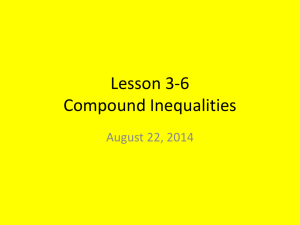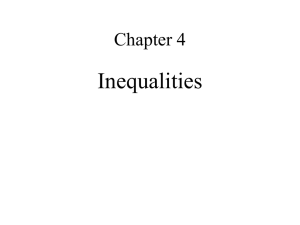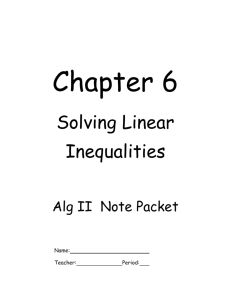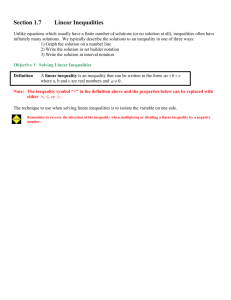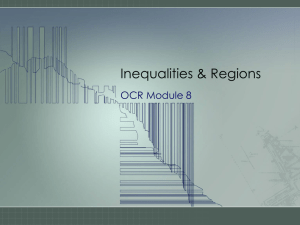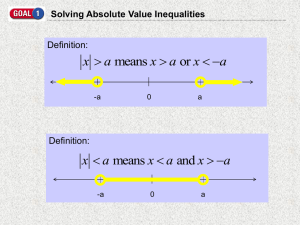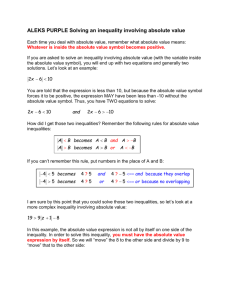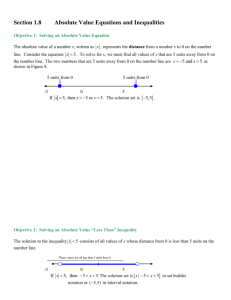Year-9-Curriculum-Overview-Spring-Half-Term-1
advertisement
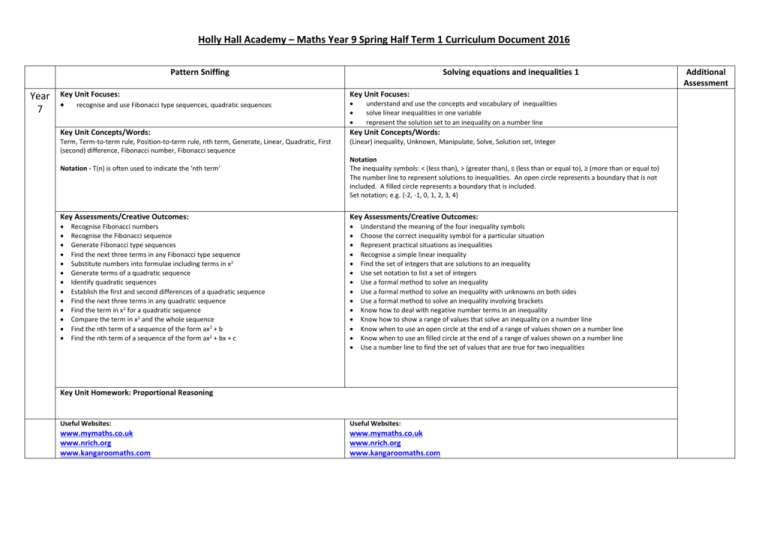
Holly Hall Academy – Maths Year 9 Spring Half Term 1 Curriculum Document 2016
Pattern Sniffing
Year
7
Solving equations and inequalities 1
Key Unit Focuses:
recognise and use Fibonacci type sequences, quadratic sequences
Key Unit Focuses:
Key Unit Concepts/Words:
Key Unit Concepts/Words:
Term, Term-to-term rule, Position-to-term rule, nth term, Generate, Linear, Quadratic, First
(second) difference, Fibonacci number, Fibonacci sequence
(Linear) inequality, Unknown, Manipulate, Solve, Solution set, Integer
Notation - T(n) is often used to indicate the ‘nth term’
understand and use the concepts and vocabulary of inequalities
solve linear inequalities in one variable
represent the solution set to an inequality on a number line
Notation
The inequality symbols: < (less than), > (greater than), ≤ (less than or equal to), ≥ (more than or equal to)
The number line to represent solutions to inequalities. An open circle represents a boundary that is not
included. A filled circle represents a boundary that is included.
Set notation; e.g. {-2, -1, 0, 1, 2, 3, 4}
Key Assessments/Creative Outcomes:
Key Assessments/Creative Outcomes:
Recognise Fibonacci numbers
Recognise the Fibonacci sequence
Generate Fibonacci type sequences
Find the next three terms in any Fibonacci type sequence
Substitute numbers into formulae including terms in x2
Generate terms of a quadratic sequence
Identify quadratic sequences
Establish the first and second differences of a quadratic sequence
Find the next three terms in any quadratic sequence
Find the term in x2 for a quadratic sequence
Compare the term in x2 and the whole sequence
Find the nth term of a sequence of the form ax2 + b
Find the nth term of a sequence of the form ax2 + bx + c
Understand the meaning of the four inequality symbols
Choose the correct inequality symbol for a particular situation
Represent practical situations as inequalities
Recognise a simple linear inequality
Find the set of integers that are solutions to an inequality
Use set notation to list a set of integers
Use a formal method to solve an inequality
Use a formal method to solve an inequality with unknowns on both sides
Use a formal method to solve an inequality involving brackets
Know how to deal with negative number terms in an inequality
Know how to show a range of values that solve an inequality on a number line
Know when to use an open circle at the end of a range of values shown on a number line
Know when to use an filled circle at the end of a range of values shown on a number line
Use a number line to find the set of values that are true for two inequalities
Key Unit Homework: Proportional Reasoning
Useful Websites:
Useful Websites:
www.mymaths.co.uk
www.nrich.org
www.kangaroomaths.com
www.mymaths.co.uk
www.nrich.org
www.kangaroomaths.com
Additional
Assessment

